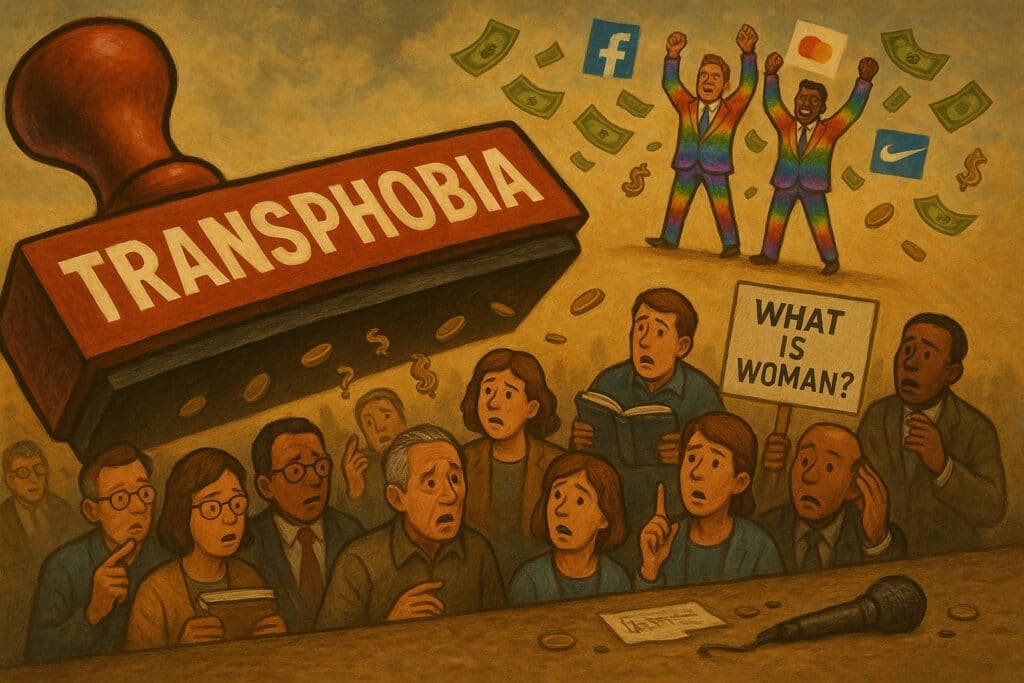Transphobia Explained: Activists’ Elastic Weapon
The Word That Can Ruin You
“Transphobia” might be the most versatile insult of the 21st century. It can end a career, cancel a book deal, or silence a parent worried about their kid. The catch? It doesn’t actually have a fixed meaning.
Once upon a time, a phobia meant fear — spiders, planes, tight spaces. Now? “Transphobia” covers anything from questioning puberty blockers for 12-year-olds to accidentally using the wrong pronoun at a dinner party. It’s not a description anymore. It’s a weapon.
Table of contents
The Elastic Definition
Officially, transphobia should mean irrational hatred or fear of transgender people. In reality, it’s an elastic label that grows with every news cycle.
- Say “women’s sports should stay women’s”? → Transphobic.
- Wonder about long-term side effects of medical transitions? → Transphobic.
- Forget a neo-pronoun? → Bigot of the century.
It’s less about fear, more about thought-policing.
From Disagreement to Hate
The brilliance of the tactic is simple: turn debate into morality. If you disagree, you’re hateful. No need to engage with your argument — just slap on the label and move on.
Doctors, feminists, comedians, even parents — once accused, you’re a villain. And villains don’t get dialogue.
Cancel Culture’s Swiss Army Knife
Need someone silenced? Accuse them of transphobia. It worked on J.K. Rowling, who merely pointed out that women exist as a biological category. She wasn’t debated. She was crowned “Queen of Transphobia.”
Heads they win, tails you lose. Defend yourself? Guilty. Stay quiet? Complicit.
Follow the Money
Why keep the definition vague? Because outrage pays.
NGOs, activist groups, DEI trainers — all need a constant villain to justify their salaries. If “transphobia” only meant violence, the funding dries up. But if it includes jokes, doubts, or silence, the cash flow never ends.
Your confusion is their business model.
The Death of Free Speech
The scariest part isn’t the fundraising. It’s the silence. Teachers self-censor. Politicians dodge the issue. Doctors nod along while privately worried. Ordinary people mutter their real thoughts only in trusted company.
Free speech hasn’t been outlawed. It’s just been socially executed.
Ordinary People, Extraordinary Villains
Most people aren’t consumed with hatred. They’re confused. They grew up in a world with two genders and a dictionary that wasn’t political. Now the rules change monthly, and failing the test gets you branded.
The average citizen isn’t hateful. They’re just late to the new ideology. That’s enough to ruin them.
Irony on Repeat
Here’s the twist: by stretching “transphobia” to cover everything, activists make it mean nothing. Real discrimination risks being drowned out in the noise. And resentment builds under the surface, creating exactly the hostility they claim to fight.
The Culture War Economy
At heart, “transphobia” is branding. If you accept the ideology, you’re loving, progressive, and inclusive. If not, you’re evil. Simple, viral, profitable.
Everyone cashes in: activists rake donations, politicians grab votes, corporations slap rainbows on products. Outrage sells.
So What Should Be Done?
The solution isn’t to deny the existence of real hostility toward trans people. It’s to rescue language from activist inflation.
“Transphobia” should mean hostility or discrimination. Not scepticism. Not questions. Until then, the word will keep poisoning debate instead of clarifying it.
Fear as a Business Model
“Transphobia” is less about fear, more about control. It’s the modern blasphemy charge — flexible, profitable, and always ready to shut you up.
And here’s the cynical truth: if activists ever defeated it, they’d lose their jobs. So don’t expect this weapon to disappear. Expect it to keep stretching.
FAQ
What does transphobia originally mean?
An irrational fear or hatred of transgender people.
Why has the meaning expanded?
Activists use it as a political tool to silence critics and expand influence.
Is every disagreement called transphobic?
Not officially, but in practice, yes. Disagreement is often branded as hate.
Who benefits from the broad definition?
Activist NGOs, DEI consultants, and corporations — outrage keeps the money flowing.
What’s the danger of this trend?
It undermines free speech, confuses ordinary people, and trivialises real discrimination.



